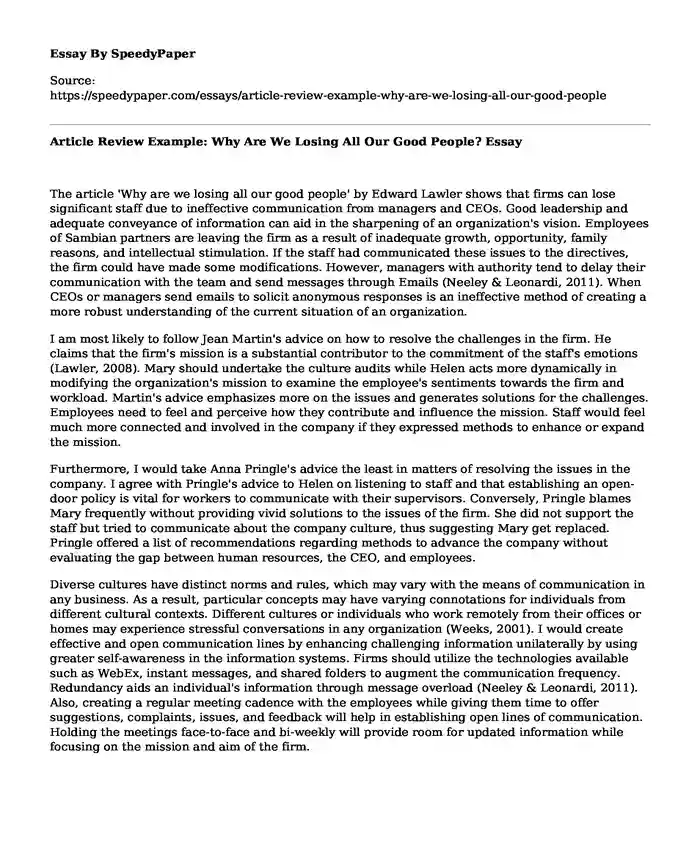
| Essay type: | Evaluation essays |
| Categories: | Management Communication Organizational culture |
| Pages: | 3 |
| Wordcount: | 613 words |
The article 'Why are we losing all our good people' by Edward Lawler shows that firms can lose significant staff due to ineffective communication from managers and CEOs. Good leadership and adequate conveyance of information can aid in the sharpening of an organization's vision. Employees of Sambian partners are leaving the firm as a result of inadequate growth, opportunity, family reasons, and intellectual stimulation. If the staff had communicated these issues to the directives, the firm could have made some modifications. However, managers with authority tend to delay their communication with the team and send messages through Emails (Neeley & Leonardi, 2011). When CEOs or managers send emails to solicit anonymous responses is an ineffective method of creating a more robust understanding of the current situation of an organization.
I am most likely to follow Jean Martin's advice on how to resolve the challenges in the firm. He claims that the firm's mission is a substantial contributor to the commitment of the staff's emotions (Lawler, 2008). Mary should undertake the culture audits while Helen acts more dynamically in modifying the organization's mission to examine the employee's sentiments towards the firm and workload. Martin's advice emphasizes more on the issues and generates solutions for the challenges. Employees need to feel and perceive how they contribute and influence the mission. Staff would feel much more connected and involved in the company if they expressed methods to enhance or expand the mission.
Furthermore, I would take Anna Pringle's advice the least in matters of resolving the issues in the company. I agree with Pringle's advice to Helen on listening to staff and that establishing an open-door policy is vital for workers to communicate with their supervisors. Conversely, Pringle blames Mary frequently without providing vivid solutions to the issues of the firm. She did not support the staff but tried to communicate about the company culture, thus suggesting Mary get replaced. Pringle offered a list of recommendations regarding methods to advance the company without evaluating the gap between human resources, the CEO, and employees.
Diverse cultures have distinct norms and rules, which may vary with the means of communication in any business. As a result, particular concepts may have varying connotations for individuals from different cultural contexts. Different cultures or individuals who work remotely from their offices or homes may experience stressful conversations in any organization (Weeks, 2001). I would create effective and open communication lines by enhancing challenging information unilaterally by using greater self-awareness in the information systems. Firms should utilize the technologies available such as WebEx, instant messages, and shared folders to augment the communication frequency. Redundancy aids an individual's information through message overload (Neeley & Leonardi, 2011). Also, creating a regular meeting cadence with the employees while giving them time to offer suggestions, complaints, issues, and feedback will help in establishing open lines of communication. Holding the meetings face-to-face and bi-weekly will provide room for updated information while focusing on the mission and aim of the firm.
Conclusion
In conclusion, effective communication is vital in establishing healthy rapport between management and their teams. Good leadership is the key to identifying the motive and solution to challenges in a firm. The lack of a transparent culture and mission makes the employees feel less connected. Complete comprehension of each staff creates a mutual understanding hence increasing efficiency, open communication, and productivity in an organization.
References
Lawler, E. E. (2008). Why are we losing all our good people? [PDF File]. Harvard Business Review. https://files.transtutors.com/cdn/uploadassignments/244250_1_why-are-we-loosing-all-our-good-people.pdf
Neeley, T., & Leonardi, P. (2011). Effective managers say the same thing twice (or more). Harvard Business Review.
Weeks, H. (2001). Taking the stress out of stressful conversations [PDF File]. Harvard Business Review. https://provost.tufts.edu/celt/files/Taking-the-Stress-Out-of-Stressful-Conversations-by-Weeks.pdf
Cite this page
Article Review Example: Why Are We Losing All Our Good People?. (2023, Dec 07). Retrieved from https://speedypaper.net/essays/article-review-example-why-are-we-losing-all-our-good-people
Request Removal
If you are the original author of this essay and no longer wish to have it published on the SpeedyPaper website, please click below to request its removal:
- Essay Example on Situation Crisis Theory
- Free Essay. Importance of Integrated Marketing Communication
- Essay Sample on Revisions to Benefits and Compensation Package
- Developing Your Team: Key to a Manager's Success - Essay Sample
- Elevating Cafe Latteria: Navigating E-Commerce for Non-Profit Success in Auckland - Free Paper Sample
- Navigating Employee Selection: Insights into Various Ability Tests and Their Relevance - Essay Example
- Navigating Project Management: Strategies, Organization, and Scope Control - Essay Sample
Popular categories




